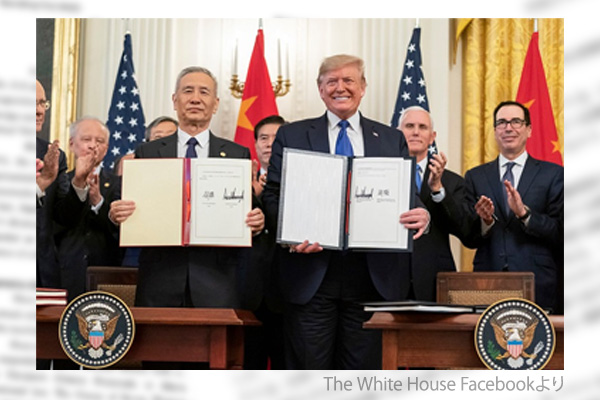The United States and China signed their Phase 1 economic and trade agreement on January 15 after two years of negotiations. The word “Phase 1” symbolizes the deal’s characteristics.
While the impact of the Phase 1 deal is not so great, a Phase 2 deal is left very uncertain, with no optimism warranted on future negotiations.
Phase 1 represents a truce
The Phase 1 agreement calls for (1) enhancing the protection of intellectual property rights, (2) prohibiting China from coercing foreign firms’ technology transfer to their Chinese partners, (3) increasing China’s purchases of U.S. farm products, (4) easing regulations on foreign investment in China’s financial services sector, (5) improving the transparency of China’s foreign exchange and currency policies, (6) expanding bilateral trade and (7) resolving bilateral trade disputes.
While U.S. President Donald Trump emphasizes the deal achieved a true structural reform, the effectiveness of many measures in the deal is doubtful, with the deal failing to cover the Chinese government’s industrial subsidies to companies. This may be the reason Trump has had no choice but to boast the achievement regarding the expansion of bilateral trade.
Regarding the trade expansion, China plans to increase U.S. imports by $200 billion in two years. In contrast, the U.S. limits its trade expansion measures to the reduction of some of additional tariffs on Chinese imports and the cancellation of plans to implement new additional tariffs, leaving most of additional tariffs on Chinese goods unchanged.
Many analysts are skeptical of China’s plan to boost imports from the U.S. by $200 billion. The increase would be unprecedented in U.S. trade history. In a manner to jab at the U.S., Chinese Vice Premier Liu He noted that China would purchase U.S. products according to its domestic demand.
Both U.S. President Trump and Chinese President Xi Jinping wanted the Phase 1 deal for their respective reasons. In the U.S., an increasing number of farmers have gone bankrupt and manufacturers in the rust belt (industrial decline zones mostly in the Midwest) have plunged into a dire situation on the fading effect of protectionist policies. Products on which the U.S. gave up on imposing additional tariffs include mobile phones, communications equipment and toys that the U.S. imports massively from China. China’s market shares of these products in the U.S. are so high that it is difficult for any other countries to replace China as providers. Given such conditions and low profit margins on these products, additional tariffs on these goods would have been passed on to U.S. consumers to seriously affect the U.S. economy.
China for its part saw a 12.5% decline in exports to the U.S. and a 20.9% plunge in imports from that country in 2019, which contributed to decelerating China’s real GDP growth in the year to 6.1%, the lowest in 29 years. China has been urgently required to improve relations with the U.S. that exerts great influence on the Chinese economy.
Phase 2 negotiations likely to drag on
Phase 2 trade negotiations between the U.S. and China are likely to drag on as they deal with the core issue of Chinese economy’s structural reform. While the possibility of the U.S.-China trade clash developing into a decoupling between the two economies is not so high, the clash may risk destroying global supply chains and promoting the disintegration of the global economy into blocs.
Japan is required to answer the question of what it should do to avoid such risk and restore a free and fair trade system.
At their meeting on January 14, the trade ministers of Japan, the U.S. and the European Union agreed to reform the World Trade Organization in the direction of expanding a ban on industrial subsidiaries, with China in their mind. They should take this opportunity to promptly expand support for the reform among WTO members and realize the reform.
Yujiro Oiwa is a Planning Committee member and a senior fellow at the Japan Institute for National Fundamentals. He is a former professor of economics at the Tokyo International University.


